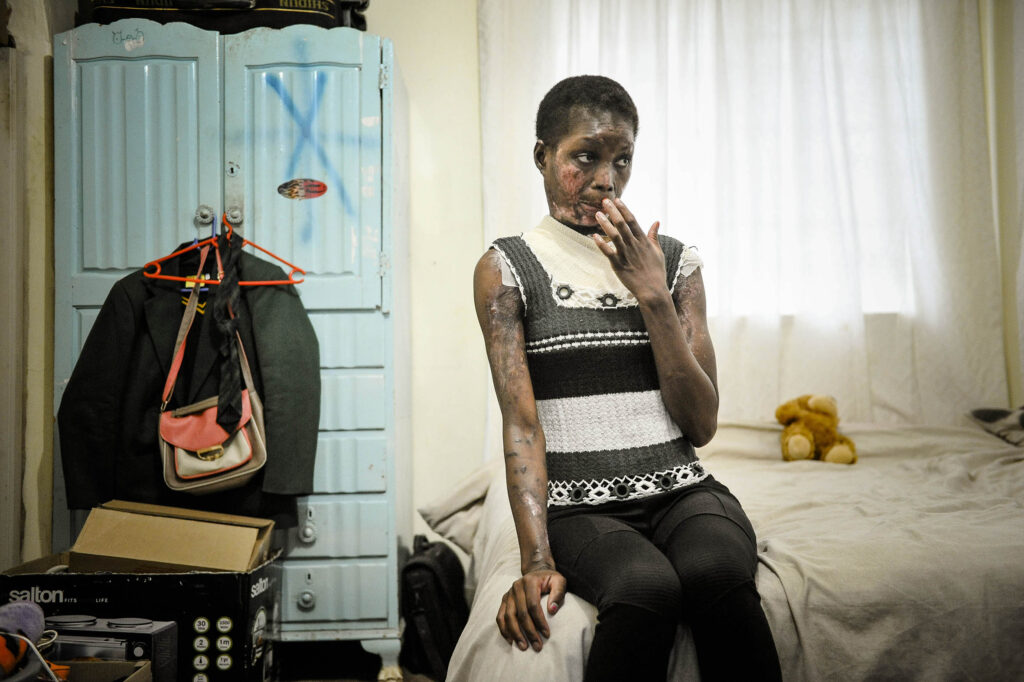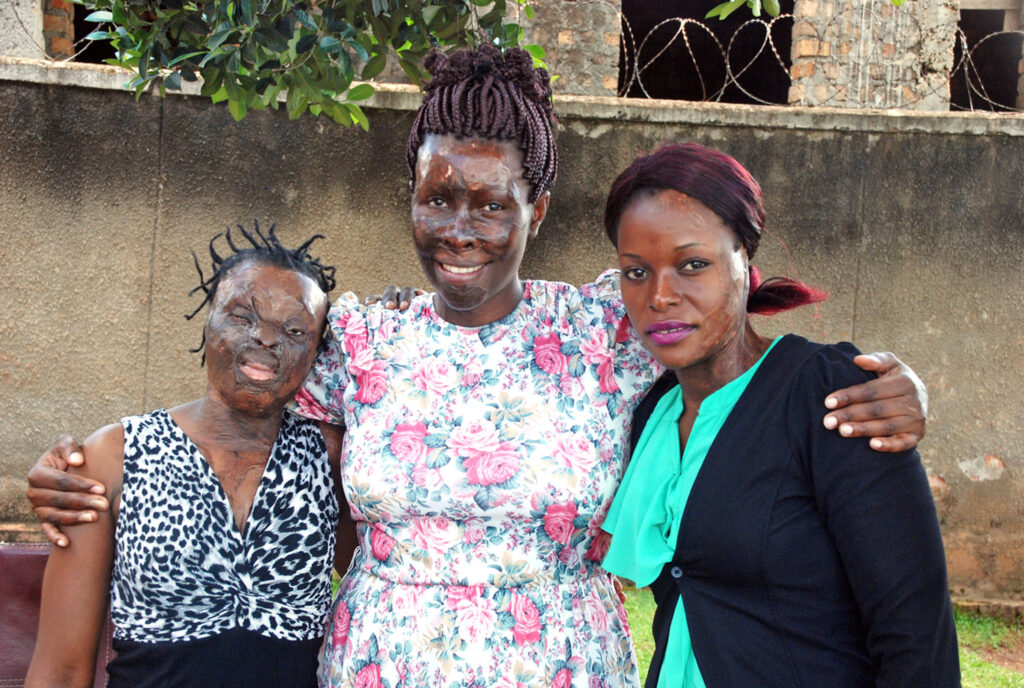In the wake of acid attacks, victims — often women — can feel hopeless. Now, women around the world are fighting back.
‘Jamiddah?”
Jamiddah Namuyumba was standing outside the small restaurant she ran in front of her house when she heard a man’s voice behind her, calling her.
She turned around, preparing to tell the man, a regular customer, that she was sorry, but she’d already sold out for the day.
But before she could, something splashed forcefully against her face. Immediately, a burning sensation began to claw over her skin. When she tried to look up to see who had thrown the liquid, she realised with alarm she couldn’t see anything at all.
She tried to scream. But nothing came out.
“I felt a sensational burn and then [I] struggled to breathe and see,” she remembers. “It’s my neighbours, alerted by my alarm, that came and picked me [up] and rushed me to a nearby clinic for first aid.”
Namuyumba had been the victim of an acid attack, a viciously personal form of violence common in more than a dozen countries in the world, including Uganda. As part of assaults, common chemicals — usually hydrochloric, sulphuric or nitric acids — are used to maim or kill victims. But attacks can also involve other corrosive chemicals such as bleach and ammonia, which can cause severe chemical burns.
Often, incidents take place in public, and the goal is almost always to humiliate and intimidate the victims.
It took more than a year for Namuyumba’s facial burns to heal enough so that she could leave the hospital and return to her family.
But for years afterwards, the stigma of what had happened nearly broke her.
“People don’t want to sit with you in a taxi because of your looks,” she says. “It makes me so sad.”

Alex Botha is a plastic surgeon at Johannesburg’s Chris Hani Baragwanath Academic Hospital, where she’s treated several acid victims. Although she says such cases are rare, their consequences can be horrific.
“[Acid] literally burns your skin off,” she explains.
“Depending on how much acid falls on you and the strength, it can burn deeper structures like muscle and nervous [system] — even bones.”
In 2014, Jan Pieterse dosed his former girlfriend Ines Antonio with acid after years of abuse. The attack made national headlines, but the prevalence of these kinds of assaults in South Africa is hard to tell, says Palesa Mpapa, legal and advocacy manager for the organisation People Opposing Women Abuse (Powa).
Without a dedicated category for “acid attacks” in statistics collected by the police or the courts, she says, this type of aggression is usually recorded as domestic violence or other types of assaults.
Pieterse, for instance, was eventually sentenced to 10 years in prison in 2015 for assault with the intent to cause grievous bodily harm. At the time, Antonio faced a long road to recovery, which included several reconstructive plastic surgeries.
For decades, activists around the world have struggled to curb acid attacks, which the police and courts often deem “domestic disputes” to be settled privately within families in countries such as India, Bangladesh and Uganda. Now, they are turning to the law to prevent attacks.
Assailants favour acids that are cheap and plentiful in most countries. A litre of hydrochloric acid can cost as little as $0.37 (R6) in India. In Cambodia, where some families still rely on battery acid to help power their homes, a litre of the caustic liquid costs even less, a 2011 report from the United States’ Cornell University shows.
Sulphuric acid — the stuff of industrial drain cleaners — sells for as little as $0.15 (R2) in Bangladesh. But there you’ll need a licence to buy it.
Bangladesh had about 3 000 acid attacks between 1999 and 2011, according to estimates by the advocacy organisation Acid Survivors Foundation (ASF).
But since a 2002 law began heavily regulating the sale of many acids, attacks have decreased by at least 15% annually, ASF reports.
In India, a 2013 Supreme Court judgment recommending tighter legislation prompted at least one state to ban open sales of some acids. The judgment also provided for a compensation scheme for acid attack victims.
The United Kingdom is now considering allowing police to search anyone suspected of carrying corrosive substances without probable cause after acid attacks there almost doubled between 2006 and 2014, according to National Health Service (NHS) figures. The NHS recently released new guidance on acid attacks, urging victims to call emergency services, remove tainted clothes and rinse burned skin under cold water.
Web retailers Amazon and eBay both removed a 91% sulphuric acid cleaner after the UK’s Daily Mirror highlighted the ease with which it could be bought.
South Africa, however, does not regulate the sale of acids commonly used in attacks. Mpapa says this might be difficult.
“The easiest way to access acid is through a battery of a car. It’s difficult to restrict access to your personal property,” she says.
“It’s [really] an issue of addressing violence within a domestic set-up.”

Uganda passed the Toxic Chemicals Prohibition Control Bill in 2016. Although the law is focused on curbing the possibility of chemical weapons rather than acid attacks, activists from the Center for Rehabilitation of Survivors of Acid and Burns Violence (Ceresav) say this has drawn attention to their cause.
Still, survivors like Namuyumba are mostly left on their own to pick up the pieces of their lives.
Ceresav has stepped into that vacuum, offering job training and support to victims. Namuyumba, for instance, now spends her days weaving baskets and wall mats at the organisation’s Kampala offices. Ceresav’s founder, Hanifa Nakiryowa, knows what it’s like to be in their shoes.
In 2011, after seven years of marriage to an abusive husband, she walked out.
“I didn’t think I would survive another year if I stayed,” she recalls in Ceresav’s petition to support the toxic chemical control Bill.
“I felt empowered and free and finally looked forward to my future.” Three months later, in retaliation, he attacked her with acid, blinding her in one eye and scarring her face.
As she lay recovering in hospital, she met other survivors, and, when she heard their stories she felt a surge of purpose.
“I felt I had other positive things to do despite the attack,” she says. “I didn’t have the money to buy justice, but I had the brains to go on.”
The next year, she founded Ceresav.
Between 1985 and 2010, Uganda recorded 382 victims of acid violence, according to a report by the local NGO Acid Survivors’ Foundation Uganda (Asfu). Asfu says the number is likely higher.
However you parse the figures, most of them are women. The most common motive for attacks is relationship problems, according to Asfu. Activists say female victims have a particularly tricky time seeking justice since they are often seen as adulterers who brought the attack on themselves.
Another reason is conflict over money or property.
In 2011, for instance, Jane Mutesi was running a successful electronics store when she was attacked one night outside her house. The perpetrator was never found, but she suspects former business contacts who wanted her store were behind it.
After the attack, Mutesi closed herself off, fearful of how she would be judged.
“I would just close myself inside my house from morning until evening,” she says. “Even some of my family and friends didn’t want to associate with me.”
She finally plucked up the courage to go out and look for work. Employers turned her away brusquely. They didn’t want to employ someone “disfigured”, they said.
It wasn’t good for business.
Finally, a small informal grocery store said they’d give her a shot — on two conditions. She had to work the night shift and she had to wear a mask. She consented, but soon after, lost the job.
Many acid attack survivors come to Ceresav with similar stories, says Justine Mpagi, the organisation’s executive director.
“They start comparing life before the attack and life at present,” she says. “They usually lose hope, and this is what we try to change by telling them that life continues even after the attack.”
Nakiryowa, meanwhile, has found purpose in her activism.
“He thought he would break my spirit,” she has written of her ex-husband and his attack against her.
“But he only made me stronger.”
— Additional reporting by Ryan Brown and Adri Kotze
Nelisiwe Msomi was a health reporter at Bhekisisa.




